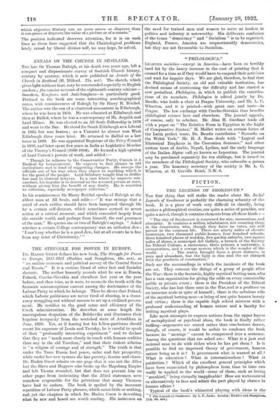THE STRUGGLE FOR POWER IN EUROPE.
DR. HADEN GUEST defines his new book, The Struggle for Power in Europe, 1917.1921 (Hodder and Stoughton, 16s. net), as " an outline economic and political survey of the Central States and Russia." It is a curious blend of sober fact and Socialist rhetoric. The author honestly records what he saw in Russia, Poland, Czecho-Slovakia and elsewhere last year or the year before, and then tries, as it were, to reconcile the truth with the fantastic misconceptions current among the doctrinaires of the Labour Party to which he belongs. Thus he shows that Poland, which Labour politicians are never tired of abusing, is a demo- cracy struggling not without success to set up a civilized govern- ment. He testifies to the good sense and efficiency of the Czech administration. He describes at some length the unscrupulous despotism of the Bolsheviks and illustrates their hopeless incapacity from the wretched state of _Astrakhan in June, 1920. Yet, as if fearing lest his fellow-partisans should resent his exposure of Lenin and Trotsky, he is careful to speak of their " profoundly interesting experiment " and to declare that they are " much more closely in touch with human realities than any in the old Tsardom," and that their violent atheism is " a religion of courage and of strength." The truth is that under the Tsars Russia had peace, order and fair prosperity, while under her new tyrants she has poverty, famine and chaos. Dr. Haden Guest admits on one page that it was not the Allies but the Slays and Magyars who broke up the Hapsburg Empire and left Vienna stranded, but that does not prevent him on other pages from insinuating that the Allied statesmen were somehow responsible for the privations that many Viennese have had to endure. The book is spoiled by the incessant repetition of Labour Party phrases, which mean little or nothing, and yet the chapters in which Dr. Haden Guest is describing what he saw and heard are worth reading. His insistence on
the need for trained men and women to serve as leaders in politics and industry is noteworthy. His deliberate confusion • of the terms " democracy " and "Socialism " is to be regretted. England, France, America are unquestionably democracies,. but they are not favourable to Socialism.


































 Previous page
Previous page